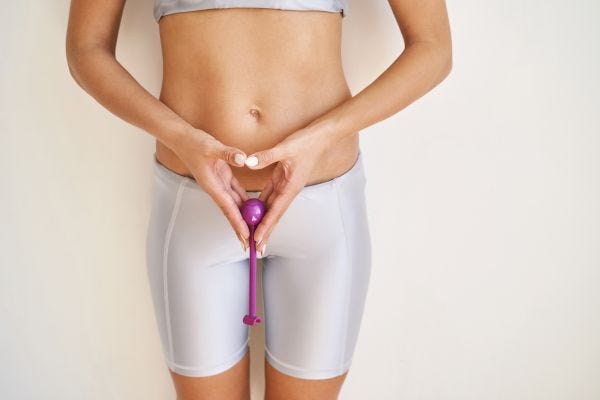Do you leak when you sneeze or cough? Maybe even when you laugh or work out?
If so, you might be experiencing something called stress urinary incontinence which is common among adults.
Incontinence can be disruptive to your daily life, but many treatment options are available, and there are lots of things you can do to help prevent leakage. Read on to discover why you leak when you sneeze or cough and to get helpful tips on how to handle your (very common) symptoms.
What Is Stress Urinary Incontinence?
Stress urinary incontinence (SUI) is a type of urinary incontinence that’s often discussed when talking about women’s health because it affects 1 in 4 women, but there are an estimated 3.4 million men with SUI. With SUI, urine leaks from your body during times of physical activity or movement.
Causes of Stress Urinary Incontinence
Check Your Eligibility
2 Easy Steps
Discover the continence care essentials available through your Medicaid plan.
SUI is caused by the diminished ability of the pelvic floor muscles to accommodate for the pressure demands from physical activity placed on them, which may be due to weakness and / or diminished muscle coordination. These muscles support the urinary sphincter, so as they grow weaker, your urethra loses its ability to hold in urine.
Common causes of urinary incontinence in women include:
- Vaginal-delivery childbirth
- Urinary tract infections (UTIs).
- Neurological disorders, such as spina bifida, multiple sclerosis (MS), Parkinson’s disease, etc.
- Pregnancy
- Menopause
- Chronic coughing.
- Injury to the nerves that supply the pelvic muscles.
- Pelvic surgery, such as a hysterectomy.
- Aging
In men, the most common causes of SUI include:
- Prostate surgery (the leading cause of SUI in men).
- Enlarged prostate or treatments for enlarged prostate.
- Neurological conditions.
- Nerve injury to the nerves that supply the pelvic muscles.
What Are the Symptoms of SUI?
Unlike urgency incontinence and overactive bladder (OAB) (which occur when you have a sudden urge to urinate), SUI occurs when the feeling of voiding is not present. However, it is possible to experience a combination of both SUI and OAB / urge incontinence, called mixed incontinence.
The main symptom of SUI is urine leakage. This can occur when you engage in physical activities or movements that relate to abdominal pressure, including:
- Sneezing
- Having sex
- Coughing
- Lifting heavy objects.
- Exercising
- Running
- Jumping
- Laughing


Risk Factors of Stress Urinary Incontinence
- Having excess weight (obesity).
- Smoking
- Pelvic organ prolapse.
- Constipation
- Pelvic surgery.
- UTI
- Neurological conditions.
- Injury to nerves that supply pelvic muscles and bladder.
- Amenorrhea
- Low BMI (being underweight).
- Diabetes
- Hormonal changes (estrogen fluctuations).
- Medications that relax the muscles of the bladder neck.
- Urinary retention (overflow).
Treatments for Stress Urinary Incontinence
Experiencing an unintentional loss of urine when going about your day can be challenging to deal with. Here are some immediate and long-term solutions you can try out.
Immediate & Long-Term Solutions
Give these immediate, nonsurgical treatments a try. They may help decrease the amount of urine that comes out when engaging in activities that usually cause leakage.
- Contract your pelvic floor before sneezing or coughing. Try to do a Kegel (pelvic floor muscle exercise) and contract your pelvic floor muscles before the sneeze or cough comes out. This could help close the urethra further.
- Try incontinence products. Products like absorbent pads or adult briefs can soak up leaks and dribbles to keep you dry. They can be worn at any time during the day or night and they’ll also help you stress less about leaking.
- Do some Kegel exercises. Pelvic floor muscle training exercises, like Kegels, are great for toning and engaging your pelvic muscles. And, contrary to popular belief, these exercises are for both men and women alike.
- Quit smoking. Smoking is bad for you, but you knew that! In addition, smoking can lead to lots of coughing, so quit now to prevent further loss of pelvic floor muscles.
- Limit bladder irritants. Irritants such as alcohol and caffeine can irritate your bladder because they act as a diuretic, increasing urine volume and output, potentially heightening the sensitivity of the nerves that supply the bladder lining.
- Maintain a healthy weight. Weight loss and maintaining a healthy body weight have been shown to reduce symptoms of SUI.
- See a physical therapist. Physical therapy from a physical therapist or an occupational therapist can engage your pelvic floor muscles and may help improve their strength, reducing leakage.


- Look into surgery. In severe cases of SUI, surgical options are available. These may consist of a sling procedure for a mid-urethral sling or an artificial sphincter may be able to help both women and men.
- Try a vaginal pessary. Vaginal pessaries are an option for women and help support the bladder and decrease leakage.
- Talk with your healthcare provider. If you’re experiencing SUI and leakage that interrupt your quality of life, you should speak with a healthcare professional. They may give you a physical exam, perform urodynamic testing such as a urinalysis to diagnose your incontinence. Then, you can schedule a follow-up with a urologist or your provider to improve symptoms.
Bladder wellness is a big part of our lives. If you’re experiencing symptoms that are causing a loss in quality of life, be sure to try these tips and speak with a healthcare professional to see what you can do to help strengthen your pelvic floor.
Get Free Bladder Control Products
If you find yourself dealing with continence issues, don’t worry! Aeroflow Urology can help.
We assist in supplying FREE incontinence supplies through your Medicaid (and some private insurance plans). Not only is our service financially beneficial, but it can also alleviate stressful store trips... especially if you're facing some bathroom challenges!
Here's how it works: Instead of running out to the store for incontinence supplies at the last minute, you simply fill out our secure Eligibility Form—it's quick and easy to do. Then, if approved, your incontinence supplies will be shipped directly to your home in discreet packaging every month, ensuring privacy and ease of use.
WebMD. (n.d.). Incontinence in men: Treatment and management. WebMD. Retrieved March 11, 2022, from https://www.webmd.com/urinary-incontinence-oab/ss/slideshow-male-incontinence#:~:text=Urinary%20Incontinence%20Is%20Common%20and%20Treatable&text=About%203.4%20million%20men%20in,It's%20a%20treatable%20condition
*, N. (2022, January 7). 6 ways to eliminate leaks when you sneeze or cough. Laura Jawad. Retrieved March 11, 2022, from https://www.laurajawad.com/post/5-ways-to-support-your-pelvic-floor-when-you-have-a-cold-or-chronic-cough/
Information provided on the Aeroflow Urology website is not intended as a substitute for medical advice or care from a healthcare professional. Aeroflow recommends consulting your healthcare provider if you are experiencing medical issues relating to incontinence.











